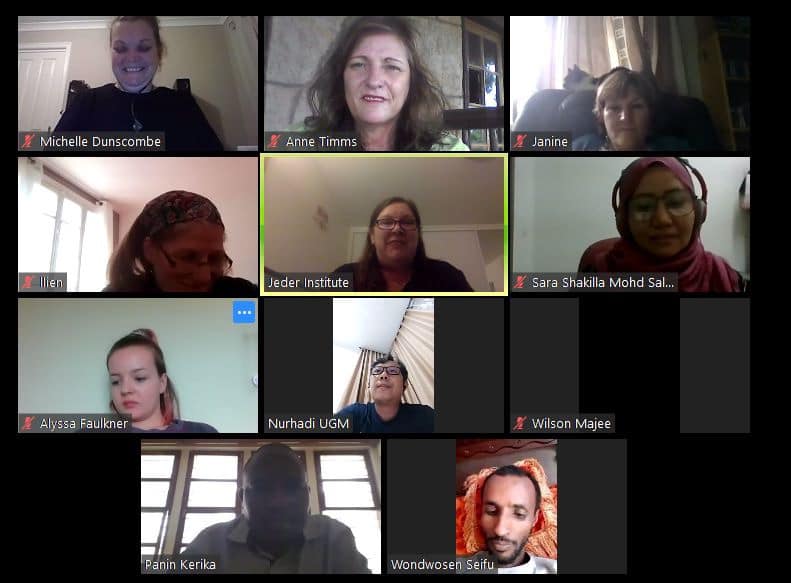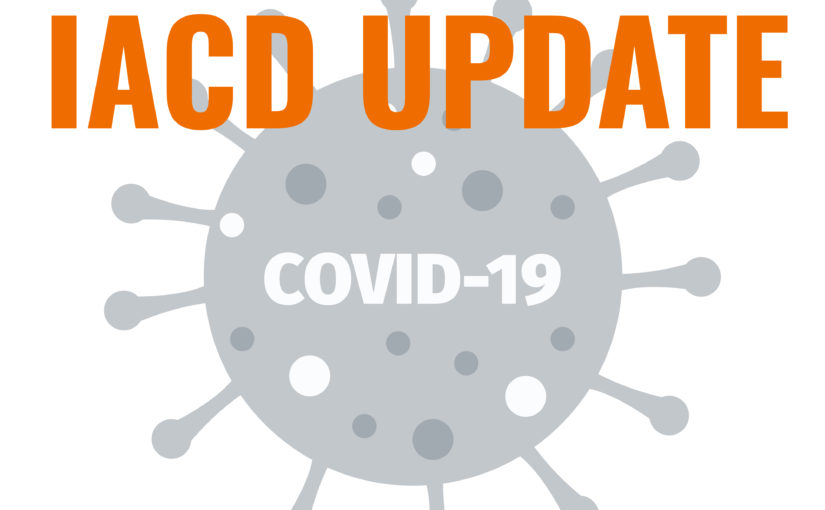IACD has been reaching out to our members throughout the past few weeks to understand and promote examples of community responses to Covid-19. We’ve heard from several members and Country Correspondents about how their communities, regions, and countries are responding the challenges presented by the spread of Covid-19.
Today, we also have an update from President Anna Clarke on the unfolding situation touching on the challenges facing communities and their resilience.
Update from IACD President, Anna Clarke
Dear friends and colleagues,
In a matter of a few short months, countries and communities around the world have experienced dramatic changes to our everyday lives, health and social care services stretched immeasurably, and sadly, among the statistics of those affected by the COVID 19 virus, we have witnessed too many fatalities. We know more about this virus every day and yet there is much we still must learn. We know that frequent hand washing, social distancing and self-isolation helps significantly. But while many of us are able to do these things, many communities do not have the luxury of clean running water or space. We know this. The social and economic inequality that existed before COVID 19 is evident in the global disparities from country to country, community to community. We must acknowledge this. We know too, that these issues of inequality will continue beyond this current crisis. As community development practitioners around the world – we must be vigilant. We must continue to help those who need support the most and we must continue to raise these issues and challenge decision-makers whose actions can help or hinder access to services and basic human rights.
This crisis has also lead to amazing stories of community spirit and heroic voluntary action. From organising food supplies for those vulnerable and self-isolating, telephone check-in services for those on their own, opening up holiday accommodation for health care workers, businesses and volunteers working together to sew surgical scrubs and face masks, an explosion of online social opportunities to keep in touch with family, join a virtual keep fit session or learn something new, offered free or delivered on a voluntary basis by someone who cares. Thank you.
As the weeks progress we know it is going to get more difficult. But we must also look for and work for hope. In this bulletin, some of our members are sharing what is happening in their part of the world and we can pick up on ideas to use. Please keep sharing your information with us and we will share it out to everyone. If you have ideas of how might be able to help in other ways – let us know. Above all, stay safe and well.
Country Correspondent Reports
Elena Shomina, Country Correspondent for Russia wrote to us: “Dear friends! In Russia were not active in reporting our news, but we have been rather active in the field of community development. During 2019, many new community groups were created, and many new forms of support were provided by state and local authorities — including additional resources, education, and literature. New signs of real appreciation emerged, such as joint partnership projects and many interesting conferences about community development were organized by different state, municipal and NGO organizations. I myself participated in 18 events since September 2019 in different corners of Russia.
Now, we have new unexpected vacations for the whole population of the country because of Covid-19 that were announced by our President. All of our schools and universities are locked and remote education was organized. Our community’s response to Covid-19 is to give special attention and support for senior people 65+. The Moscow Mayor recommends elderly people “Stay at Home”, as well as weak and pregnant ladies. Young people – “social volunteers” — help those who stay at home. All our community groups — particularly stair-case associations of the apartment buildings in the cities, help their neighbors: “evening phone calls” to lonely people are organized, as well as delivery of food and medicine. Support groups are active in social networks. Financial support is provided for different vulnerable groups (including senior people, and families with small children), and special measures of economic support will be provided for small business groups, including tax vacations, etc. We continue to believe that real good-neighbourly assistance, one of the main tools for community development, will now be particularly in demand and appreciated by its neighbors.”
31st March Country Correspondents Meeting
On 31st March, Country Correspondent Coordinator, Michelle Dunscombe, organized a meeting of all current Country Correspondents. During this call, Country Correspondent for Ethiopia Wondwosen Seifu reported that his country currently has 25 cases and 2 recoveries. Two organizations have taken the lead in the Covid-19 responses, and the government has advised people to stay in their homes. Right now, -the Ministry of Health and Technology is developing medicine for the virus together with Indigenous communities. This development has had a positive result and there is hope for a cure in the future.
IACD’s Regional Director for Oceania, Dee Brooks, noted the impact on her and her communities. Dee has been an intentional nomad for more than five years, and she’s transitioning to a more stationary role. She’s staying active with phone calls to members and Country Correspondents, but all organizational work has been suspended.

Indonesia’s Country Correspondent, Nurhadi, told us that all universities are on lockdown and the Ministry of Human Resources has told everyone to work from home. He notes that online learning is getting better and faster. He also remarked that some food stalls have already closed, but supermarkets and malls still operate. The government has reallocated $US25mill of its budget to fight to cover vulnerable people during this time.
Our Country Correspondent from Malaysia, Sara Shakilla Mohd, reported that there is a no-movement order in place in Malaysia. The government is focusing on an economic stimulus package for workers who have lost income. Her university is focusing on social and economic behavior, working together to innovate for solutions to the challenges presented to communities.
Anne Timms and Janine Ward are Country Correspondents for South Africa. Anne reports that participating in online learning platforms if internet is possible helps keep communities connected. She also is getting involved with mobilizing local resources. Janine reported on many responses seen in communities — tented areas in the streets for homeless people, and ABCD people putting up shelters and emergency shelters, food parcels and bedding.
In addition, Janine provided IACD with a couple of articles that detail coronavirus relief efforts in communities. “Safe Home Established by Rural Tourism Business in South Africa” can be accessed here, and “Pandemic politics: Community health workers gear up to fight COVID-19 with little protection, less pay” can be found here.
In France, CC Laure Lienard remarked that as a teacher, she finds reasons and resources to do what she needs to do. Some of the community workers she comes in contact with don’t want to let people down and they try to organize phone lines and forms of support for people with no access to internet.
Alyssa Faulkner, Scotland and Wilson Majee, USA, reported that the numbers in their countries were rising. Wilson noted that there are more cases and deaths in cities compared to rural areas. Alyssa remarked on the strict lockdown measures the UK has taken and the seriousness of the spread – noting that even the UK Prime Minister was among the infected.
Your Updates
To get in touch with IACD about your community’s response to Covid-19, please email membership@iacdglobal.org.

